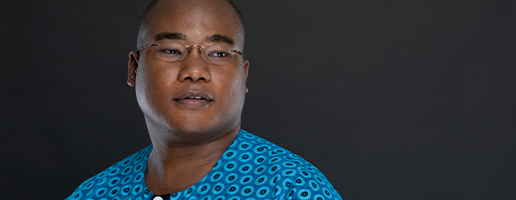Cardiologist inspired by a committed rural doctor

In 2019, Dr Zakariya Badat received a Rural Individual Fellowship Award from the Discovery Foundation to conduct a study on how to improve the management and outcomes of patients with heart attacks at Wentworth Hospital in Durban, KwaZulu-Natal.
When Dr Zakariya Badat was growing up in the small rural farming town of Weenen, KwaZulu-Natal, where most people know one another, his local family physician was a real-life hero. He remembers with great clarity how his doctor fought, albeit unsuccessfully, to save the life of his trader grandfather, who had been shot three times while emerging from prayers at the local mosque in March 1998.
The Badat family patriarch was due to testify in a burglary trial. “I remember the local GP, Dr Khan, battling throughout the night to save my grandfather but he died at five in the morning. It was a very influential incident in my life. I’d already witnessed first-hand the many lives that our doctor had made a difference to, but this was profound,” says Dr Badat, today a family medicine registrar at Wentworth Hospital in Durban.
Dr Khan had unwittingly instilled in the teenage Zakariya a passion to learn and grow. “I chose to go forward and make a difference,” he adds.
Non-stop achiever
He matriculated from Siraatul Haq Islamic School in nearby Estcourt with seven distinctions and says he was privileged to have teachers who served as both mentors and friends. He defines all he has achieved as grace from God. While excelling academically, he also committed time to his community, assisting the Al-Imdaad Foundation, the Muslim Students Association and the Islamic Medical Association of South Africa in orphanages, circumcision clinics and community clinics. “I see myself as a life-long learner and strive to commit to the Batho Pele principles,” Dr Badat says. Batho Pele or People First is a set of eight guiding principles to improve service delivery in the public sector.
While serving as a medical officer at the Inanda Community Health Centre in 2015, Dr Badat helped develop and improve protocols on acute medical emergencies and chronic lifestyle diseases, continuing to support his peers by starting a fortnightly journal club.
Boosting cardiac care at district hospitals
Dr Badat’s research will focus on the quality of care that patients with myocardial infarction – the medical name for a heart attack – receive at Wentworth District Hospital. Wentworth, a relocation area under the former Group Areas Act, is heavily industrialised and polluted as a result. The community struggles with unemployment, drug abuse and lack of recreational facilities. The prevalence of lifestyle conditions may well be higher than the national figure of 55.5%, while ischaemic heart disease – also known as coronary heart disease or coronary artery disease – reflects the national rating as among the top 10 leading causes of death.
Dr Badat wants to produce a healthcare baseline that can change policy and guidelines and improve overall care of heart attack patients in district hospitals. Wentworth Hospital is not a designated cardiology facility. Its doctors cannot conduct invasive procedures like inserting stents or doing angiograms. There is no fluoroscopy, cardiac catheterisation facility or ICU.
“We offer 24-hour cardiac monitoring through our accident and emergency service and high-care unit. We do have some cardiac biomarker and thrombolytic capacity, but if you’re ventilating someone, it’s normally for transfer to King Edward VIII Hospital or Inkosi Albert Luthuli Central Hospital,” he says, painting a picture typical of many district hospitals.
Study to increase knowledge on heart disease
Dr Badat’s study will analyse the management of patients presenting with STEMI (ST elevation myocardial infarction – a very serious type of heart attack where the heart’s major artery is blocked) and NSTEMI, (non-ST elevation myocardial infarction or another type of heart attack).
A patient’s mortality risk is gauged by using an electrocardiograph to discern which of these two conditions apply. Dr Badat says the difference is important, as patients with STEMI tend to have a higher mortality than those with NSTEMI. Each requires different treatment approaches, but owing to limited resources, the pharmaco-invasive strategy is used in the public sector. This usually requires clot-busting medicine upfront for those with STEMI, compared with the preferred inserting of stents upfront.
“We’re going to look at patient demographics, risk factors for ischaemic heart disease, presentation symptoms, time to perform the electrocardiogram, time to fibrinolysis (administer blood clot busting medicines), time to follow up with cardiology, and 30-day mortality,” he adds. He’s begun collecting data from 120 patients treated over one year in Wentworth Hospital’s accident and emergency and high-care units, but hopes to cover even more, with records dating back to the inception of the unit in 2016.
As for the modifiable risk factors pushing the increase in noncommunicable diseases, he wants to become more familiar with those that his patients are presenting. “Right now, we’re mopping the floor and not addressing the tap that’s leaking,” he says, quoting one of his mentors, Dr Gloria Mfeka-Nkabinde, another Discovery Foundation alumna.
He says his supervisor Dr Selvandran Rangiah has ignited the flame and steered him to his passion and commitment to increasing available knowledge.
About the Discovery Foundation
Each year, the Discovery Foundation gives five different awards to outstanding individual and institutional awardees in the public healthcare sector.
The Discovery Foundation is an independent trust with a clear focus to strengthen the healthcare system by making sure that more people have access to specialised healthcare services.
Since 2006, the Discovery Foundation has invested more than R230 million in training and support for more than 400 medical specialists and institutions. The grants support academic research and clinical science, sub-specialist training, rural medicine as well as programmes to develop public healthcare resources. For 2019, Discovery Foundation awarded 42 grants to medical specialists working in South Africa’s healthcare sector to the value of R27 million.
Learn more and apply for the 2020 Discovery Foundation Awards.
Related articles

Finding a link between diarrhoea and HIV infection in children
Diarrhoea is a leading cause of death in children under five, especially in under-resourced communities. That’s why Dr Mani Chiliwe applied for a Discovery Foundation Rural Fellowship Award to find better ways to treat children with prolonged diarrhoea.

Taking away the suffering of little children
Dr Boitumelo Pitso has received a Discovery Foundation Sub-Specialist Award to study Paediatric Pulmonology. She hopes to improve the quality of life of children with chronic lung diseases who often battle with coughing, sleeplessness and poor concentration.

Making a heartfelt difference in patients with high blood pressure
Armed with a Discovery Foundation Rural Individual Fellowship Award, Dr Trenton Oliver is determined to raise awareness on hypertension, or high blood pressure, and to educate patients in KwaZulu-Natal on how and when to take their medicine.